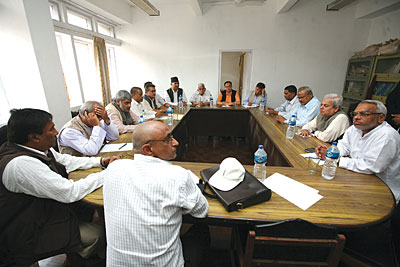 KIRAN PANDAY |
On Monday, the Madhesi parliamentary party offices in Singha Darbar were abuzz with activity in the run-up to the third round of voting. Leaders slipped in and out, even as there was an avalanche of rumours outside � Upendra Yadav will split from the front; Bijay Gachchadar has threatened his MPs not to cross the floor; or the extended meetings are a way to keep everyone guessing but the decision to remain neutral has already been taken.
A little further away, in the CA building in Baneswor, the Maoists saw a flicker of hope in the divisions within MJF and launched a subtle propaganda war as to how they were sure to win.
The stalemate eventually persisted. But what was clear was that all political forces are in an extremely difficult spot, finding it hard to balance the pulls and pushes they are facing. Nepali politicians have a far tougher job than is often recognised.
Take the Madhesi front. There is a strong argument, made by Upendra Yadav and supported by a faction in the other parties, that this is the best time for the Madhes to strike a deal with the Maoists. Their bargaining position has never been better; they can thrive as long as the Big Three keep fighting; the Madhes is getting a chance to shape the central politics in an unprecedented way; and the Maoists are more committed to federalism and inclusion. Restless MPs who cannot wait to be ministers echo this line of thinking.
But an equally powerful counter-argument is that the Maoists cannot be trusted; they may just use the alliance with the Madhesi front to make a comeback in the Tarai; this would be suicidal since the mood in the plains is anti-Maoist; there is little guarantee that the Maoists are indeed interested in writing the constitution; and Pushpa Kamal Dahal is a master at using and disposing of partners. Add to this the pressure from the Indian establishment, which has made it clear that it will not take it too kindly if Madhesi MPs shift their allegiance to the Maoists.
Or consider the Maoists themselves. Dahal is closer to his aim of leading the government than he has been in the past year. He has shown remarkable energy and dynamism in trying to stitch together alliances, lure MPs, and engage with established power centres, unlike Ram Chandra Poudel, who appears to be merely going through the motions. The Maoist success in breaking the 'democratic alliance' and engineering rifts within each Madhesi party are major achievements for the party.
But Dahal's personal reputation has suffered in the process. Three defeats have made him a cartoonist's delight. His dalliance with royalists is public knowledge. And there is increasing pressure on him to withdraw and allow a fresh process, for an outcome through the present round of voting will not necessarily lead to a constitution � which remains the official Maoist goal.
India has its own dilemmas. It invested considerable political capital in holding the Madhes back in the last round. But there appears to have been some confusion on Wednesday in Delhi about whether it made more sense to make the best of a bad situation and allow a Maoist-Madhes government, or stick to the policy line of keeping the Maoists in general, and Dahal in particular, out of power till they undergo a 'course correction'. For now, the old line has prevailed and the Madhesi alliance will be encouraged to stay together and remain neutral.
India has raised the stakes considerably by sending Shyam Saran as special envoy. Delhi will now get the flak for whatever happens � if there is a result and Dahal wins, non-Maoist parties will blame them for having engineered it; if the stalemate continues, Dahal will ratchet up the rhetoric on 'foreign intervention'. But the criticism will be meaningless, and it would be a stellar contribution if Saran can use the authority of the Indian Prime Minister to encourage actors to think beyond the numbers game and get the broader process on track.
Madhesi leaders have told us the front will probably remain neutral once again in the fourth round. But there could be some increase in cross-voting. In addition, if the Maoists can get a section of the UML, CP Mainali's ML faction, and parts of RPP, Dahal has a chance.
At press-time, this remains an unlikely prospect for the potential costs of defecting to the Maoists remain high for all politicians, especially those from the Tarai. Nepal's parliament will probably make history by failing to elect a PM for the fourth time. If that happens, there must be an effort to begin the process afresh.
READ ALSO:
Tail between our legs, PUBLISHER'S NOTE
Nay to the government, INDU NEPAL
Following the paper trail, CK LAL
Systemic failure, ASHUTOSH TIWARI



